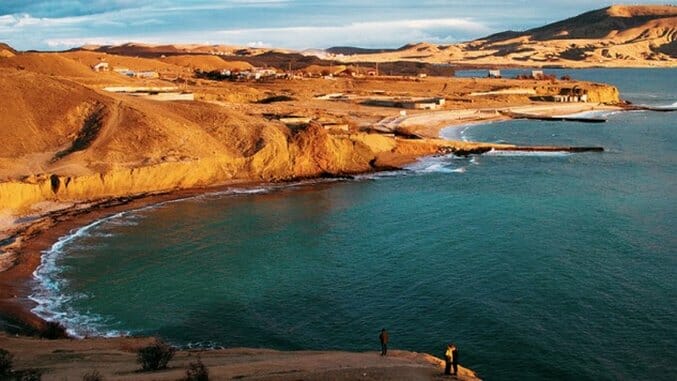deGeneration X: Buck Naked Jazz on a Black Sea Beach

My situation seemed comically surreal. On a grand stage in the middle of a Black Sea beach, a high-energy performer bangs out “Ace of Spades” on an accordion. The late, great Lemmy would surely hoist a Jack Daniel’s to this quirky performance, but an even more usual sight competes for my attention. We are standing on a nude beach, and a vodka-soaked, Commander Chekov doppelgänger swings, sways and shakes a few steps to my side while completely naked from head to toe. He committed, quite literally, to rock out with his cock out.
“For the love of god,” I whispered to a newfound friend from Boston, “I hope this guy doesn’t fall into me.” Trying to be funny, my friend motioned with his hands as if he intended to push me into Naked Chekov. Startled, I jumped, and my friend cracked a wry Bostonian smirk. “The Celtics suck,” I said in retaliation.
Crimea is a pendant-shaped Black Sea peninsula famous for Yalta, the city where FDR, Stalin and Churchill carved up Europe after World War II, and the beach towns dotting its coastline make up what tour agencies like to call the Russian Riviera. Stalin so adored Crimea that he relocated the local Tatars to Uzbekistan and other Central Asian nations after the war to make room for wealthy Russians and their socialism-funded vacation cottages. Interesting stops on the Crimea Trail include a well-preserved Genoese fortress in Sudak, 19th-century vineyards and sandy beaches in Novyi Svit, the Tepe Kermen Cave City of Bakhchysarai, the Vorontsov Palace (by the same British architect who completed Buckingham Palace) in Alupka, the battle site in Balaclava that inspired Lord Tennyson’s Charge of the Light Brigade and the hippie-centric resort town of Koktebel.
In Crimean Tatar, Koktebel means “Land of the Blue Hills,” and its claims to fame include Symbolist poet Maximilian Voloshin, the Karadag Nature Reserve and the postcard-selling Golden Gate rock a few hundred feet offshore. Natural and literary beauty aside, Koktebel is an arts-friendly charmer that boasted the most famous nude beach of the former Soviet Empire. In the late summer, the annual Neptune Day hosted world-class body artists depicting the birth of Venus on naked bodies, but when I visited in September 2009, the art scene turned to tunes with the Koktebel Jazz Festival.
The previous month, I arrived in Kiev, Ukraine, where I made several new friends, including a lovely young lady from Washington state doing nonprofit work in Ukraine. She told us about the Koktebel Jazz Festival, which draws international artists from around the world performing directly on the nude beach. The festival, launched in 2003 by Ukrainian businesswoman Lilia Mlinarich and Russian television journalist Dmitry Kiselyov, embodied the town’s hippie spirit by allowing free access to the beach stages, and each night, thousands of people spread out across the small, smooth rocks to enjoy food, vodka, wine and live jazz music. All my new friends at the Kiev hostel wanted to go, and we agreed to reconnect there a month later.
I opted to splurge—by Ukrainian price-point standards—on the Galeon Hotel near the Karadag (Black Mount) volcano, but the town had several guesthouse options, and some people camped on the beach. As Crimea’s prime naturalist destination, Koktebel naturally drew more progressive Eastern European types, and the jazz festival doubled down on the hipness. It was the only time passing through Russia or Ukraine that I encountered public cannabis smoking, which Louis Armstrong might call the sign of legit jazz musicians.
Arriving late in the afternoon, our group of American and British degenerates headed to the jazz stages, which was where I encountered Magic Mikhail, or whatever rock-out calls himself. The next day, we hit the naturalist beach, which was not exactly what we expected.
“For a nude beach, there is not a lot of nudity,” observed one of the Americans.
Looking around, we saw a few random sunbathers without tan lines, but Ukrainian supermodels they were not. Most were actually a bit long in the tooth. Then, surprisingly, a British doctoral student in our group went the full monty.
“Let’s go!” said the man I would now call doctor as he dropped trow and ran into the water.
“Who’s next?” I joked. There were no takers, at least not sans suits.
-

-

-

-

-

-

-

-

-

-

-

-

-

-

-

-

-

-

-

-

-

-

-

-

-

-

-

-

-

-

-

-

-

-

-

-

-

-

-

-








































